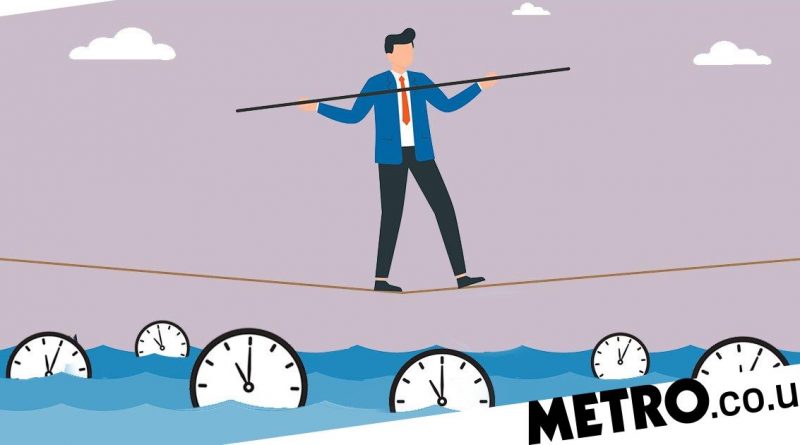How to stop letting minor setbacks throw you off track

We’ve all been there: you go to bed with a full to-do list written out in your notes app and an alarm set for 7AM.
But then your alarm doesn’t go off, or your phone dies, or you have unexpected visitors and everything, frankly, goes to sh*t.
I recently sprained my ankle.
This meant I couldn’t do my usual activity, which consists of Brazilian jiu jitsu and weight training.
So much of me, considering I couldn’t do what I usually do, wanted to stop exercising completely – it’s an all or nothing mindset that plagues many of us.
When one thing goes wrong, the rest goes with it.
But why do small setbacks hold such power over our lives?
A change to our assumptive world
According to Counsellor John Wilson, this way of thinking is caused by the fact that each of us live in what psychologists call our personal ‘assumptive world’.
‘This is an idea proposed by psychiatrist Colin Murray Parkes in 1971 to explain the grief we experience when our safe world suddenly changes,’ Wilson tells Metro.co.uk.
‘Our orderly existence is thrown out of kilter, and we either have to get it back or adapt to the new in order to avoid feelings of anxiety and depression.
‘Even a small change, like missing a commuter train, the car not starting or waking up to a power cut, is a shock to the cosy familiarity of our assumptive world, especially if we need routine for our emotional security.’
It can be difficult to adapt straight off the bat and, while some people enjoy the challenge, others – especially those who find comfort in a routine – may be completely knocked back.

An external locus of control
We tend to allow setbacks to take over our mood, day or even week when we have an external locus of control, explains Danielle Haig, principal business psychologist at DH Consulting.
Essentially, this means that your feelings and emotions are ruled by things outside of your own intuition and self.
‘When we give control away to the world and circumstances, we’re out of control,’ Haig tells us.
‘When we’re out of control, we become victims of life.’
This results in feeling like any setback, no matter how small, can’t be fixed.
‘We essentially relinquish control of our lives to the universe,’ Haig continues.
‘You can see how a small setback can seem like an overwhelming issue when actually, it’s a minor inconvenience.
‘If you internalise your control over the situation (an internal locus of control) then you realise that you can choose your mood, your response and your behaviour and overcome whatever setbacks come your way.’
How to stop letting minor setbacks throw you off track
So how do we get to that point?
There are some techniques and tips to stop yourself from allowing minor setbacks from ruining your day or even your month, destroying any progress you’ve made, and could have made, in the process.
The two-minute trick
The two-minute trick is designed to help us get started on something we might be procrastinating following a setback.
‘Promise yourself that you’ll do two minutes of whatever it is you’re putting off,’ Bex Spiller, founder of The Anti-Burnout Club tells Metro.co.uk.
‘For example, let’s say you missed a morning run and now you can’t be bothered to do it the next day – promise yourself that you’ll just do two minutes or anything that will get you closer to your morning run routine.
‘Perhaps that’s putting on your workout clothes or lacing up your trainers.
‘Often, the hardest part of motivation is just getting started and, once you’ve got the ball rolling, it becomes a lot easier to keep momentum.
‘Anyone can do something for two minutes!’

Reframe the setback
It can be easy, and perhaps natural, to look at all setbacks as inherently negative.
But, what if that isn’t the case?
‘When you think about it objectively, setbacks are nothing more than feedback, an education and a step to something better,’ says life coach and author of Energize, Simon Ong.
‘Reframing the experience in such a way allows you to see setbacks from a more productive perspective.
‘Remember: ego seeks perfection; humility seeks progress.
‘Ultimately, the universe will deliver moments of beauty, opportunity and pain to your doorstep.
‘All of these are gifts, if you have the humility to seek the lessons within each.’
One degree every day
Another technique is to remember that, in the grand scheme of things, small setbacks like missing the train or even spraining your ankle have little impact on your overall goal.
Spiller explains: ‘Imagine your goal is like an ice cube in a room.
‘Every day you work towards your goal, you’re heading into that room and turning up the temperature one degree.
‘You don’t know how long it will take for that ice cube to melt, but you know that eventually it will.
‘Now, when a small setback happens, all it means is that you didn’t turn the temperature up that day and that’s okay – nothing will have changed, the ice cube is still at the same temperature it was yesterday, you haven’t failed.
‘What is important, however, is that you go back the next day and turn the temperature up.
Small, 1% changes add up and just because you missed one day doesn’t mean that you’ve entirely failed in your goal!
‘Use this analogy to combat all or nothing thinking and motivate yourself towards small daily improvements, even when there are setbacks.’
Mind how you talk to yourself
Negative self-talk can have a profound effect on motivation.
That’s why, when we experience a minor setback, especially something like waking up late (guilty!), we need to be careful not to be so mean to ourselves.
‘When we trash-talk ourselves, we further reinforce that we’re useless or that we can’t do something even after the tiniest of setbacks,’ says Spiller.
‘When we do this, all that happens is that it completely drains us of motivation.
‘We start believing that negative self-talk and it’s basically impossible to get back on track.
‘When you catch yourself trash-talking yourself, try reframing it instead.’
Remember how far you’ve come
Finally, it’s important to take a step back and remember how far you’ve come.
Ong tells Metro.co.uk: ‘Be compassionate with yourself and make sure you are speaking to yourself in the same way you would to someone you deeply care about.
‘If you have experienced a setback, remind yourself that you can’t learn to stand up without falling or improve without feedback.
‘Be kind and forgive yourself when you make mistakes or experience setbacks.
‘You are only human and you must balance the experience of these with the acknowledgement of just how far you have come.’
Do you have a story to share?
Get in touch by emailing [email protected].
Source: Read Full Article



